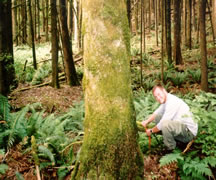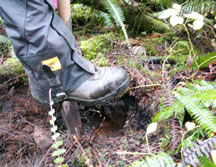Graduate Students:
Nick Roberts, BSc Honours, 2004
Influence of bigleaf maple on forest floor depths and humus forms of mixedwood stands in Southerwestern British Columbia
Abstract
Bigleaf maple (Acer macrophyllum Pursh) is a tree-sized deciduous species common in the overstory of mixedwood stands in southwestern British Columbia. Results from studies of other deciduous species suggest bigleaf maple has the potential to increase nutrient cycling and availability in deciduous-conifer mixed stands. Bigleaf maple may, therefore, positively influence the quality of these sites and growth of intermixed conifers. Such increased nutrient cycling and, consequently, site quality are generally reflected by thinner organic soil horizons, thicker surface mineral soil horizons, and more biologically active humus forms. This species was studied to determine whether its influence is substantial enough to affect forest floor horizon depths and humus forms, and if so, whether observable influences suggest enhanced nutrient cycling. Fourteen paired plots were established under maple and conifer in 4 stands at the Malcom Knapp Research Forest, Haney, British Columbia. Stands were from 38 to 140 years of age. Forest floor and A horizon depths were measured and humus form type determined at 3 subplots for each of the 28 plots. Species were compared with and without regard for age class using statistical and non-statistical techniques. Bigleaf maple was found to influence horizon depths and humus form types. Under bigleaf maple L,F,H and Ae horizons were significantly thinner and Ah horizons were significantly thicker relative to those under conifers. Mulls and moders dominated under bigleaf maple and Douglas-fir (Pseudotsuga menziesii [Mird.] Franco), respectively. Mors were infrequent under Douglas-fir and absent under bigleaf maple. Species influences appeared to differ between the three age classes, however consistent trends in species affect with age were not discernable due to small sample sizes. Results suggest that bigleaf maple enhances nutrient cycling in mixedwood stands of the Pacific Northwest and that this role varies with age. Bigleaf maple may be a desirable species in deciduous-conifer mixed stands.

